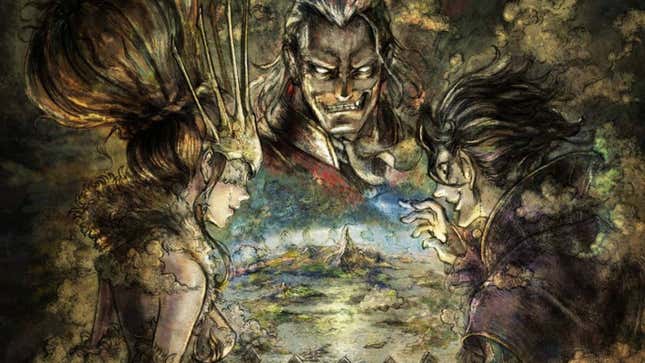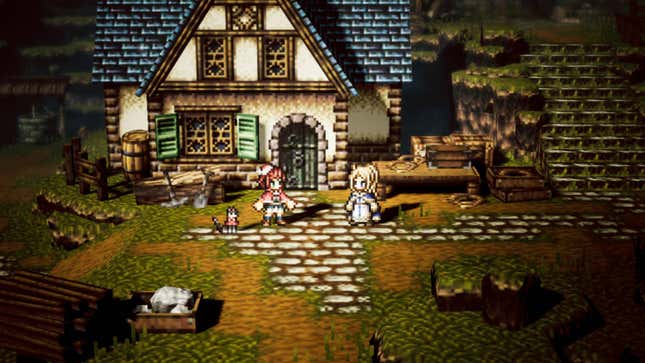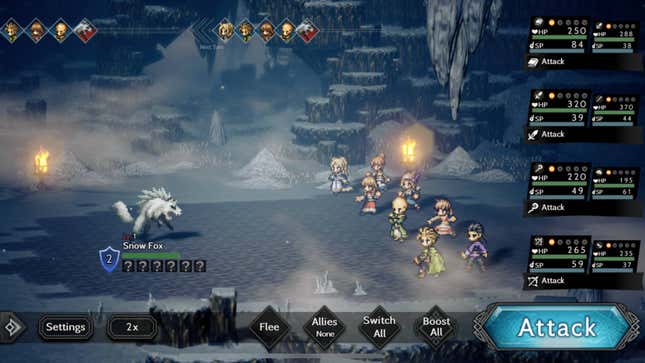
Octopath Traveler: Champions of the Continent, newly available on mobile, is a worthy sequel to the original 2018 Switch role-playing game. I had expected a watered-down combat system and a menu hell like many other gacha games on mobile devices. Square Enix proved me wrong. Champions retains the visuals and music that made Octopath a unique title in a field of pretty RPGs, and its streamlined combat is a massive improvement over the grindiness of the original game. Octopath is even better on mobile than it ever was on the Nintendo Switch.
In 2018, Square Enix released the original Octopath Traveler on the Nintendo Switch. Set in the same continent of Orsterra, Champions is a prequel, taking place some unspecified period of time before Octopath. While the protagonists of Octopath do appear in some sidequests, the narrative is centered around a band of merry adventurers who are united by the holy ring carried by the first “chosen,” your first player character (who is randomized through the gacha). It’s an interesting take on the first game’s narrative system, where eight characters happened to join up together for reasons that were even more tenuous. While there are sidequests centered around each of the characters, the main campaign focuses on three themes: wealth, fame, and power. Each main questline revolves around toppling a tyrant who exemplifies one of those qualities. The adventurer group can also accumulate points in each of those qualities, which affect NPC recruitment and resource-gathering.

Critics generally praised the first Octopath game’s art style, combat, and music, but some found the progression to be grindy and the story to be uninteresting. So I was a little nervous when I found out that Champions was a mobile game. Many players who are used to premium console titles often find the mobile grind too frustrating to endure. After years of playing games on mobile, I have an enormous amount of patience, but even I remember feeling that Octopath Traveler was a bloated time sink. I was prepared for Champions to exacerbate the original problem.
I was also concerned about how well the Octopath art style would adapt to a mobile game. The character designs are whimsical and effectively tap into the nostalgia many players feel for the 16-bit JRPGs of the ‘90s, but they aren’t exactly horny or eye-catching. With the exception of dancers, the characters wear pragmatic clothes in earthy colors. I couldn’t see myself obsessing over fanart of Octopath characters the way that I did with Caenis in Fate/Grand Order or the dragon girl Ch’en in Arknights. By the time I started Champions, I barely remembered what the Octopath Traveler characters looked like.
These were the concerns I had before actually playing the game. Eight hours later, those concerns largely forgotten, I realized that Champions is my absolute favorite way to play Octopath Traveler. The auto-travel function, where you flick the screen to auto-run across the landscape, feels intuitive. There are buttons to stack every character’s moves at once, which makes ordinary battles go by a lot faster. If I only encountered a couple of weak enemies, I could finish the battle with two taps.
Champions also introduces the concept of reserve party members in the back who can be swapped in and out at will. If someone got hit by a status effect, I simply stuck them in the back line and used the reserve party members. Benched characters also recover both health and SP (mana). Since up to eight characters are present in every battle, it’s easier to spread experience points around to more characters.
In both games, combat mostly revolves around targeting enemy weaknesses in order to break their shields. Doing so was tricky in the original game. Multiple enemies in the same battle often had different weaknesses (such as Polearms, Daggers, or Fire), and boss battles became excruciating when bosses would change their weaknesses. In Champions, however, with my party divided into two rows, I could arrange my frontline to break enemy shields with multi-hit basic attacks on the first turn, and then use my backline of powerful characters to pummel the enemy’s health on the next turn. I marveled at how Champions managed to make Octopath feel less grindy by making very small tweaks. It didn’t have to be an overhaul, and the combat still works similarly to how it does in the Switch original.

But wait, there’s more! The impact of status effects is now greatly diminished, a savvy decision that lets Champions do away with inventory management entirely. I could obtain equippable weapons and armor, but I no longer had to juggle recovery or status ailment items. I didn’t have to think about the difference between Herb of Clarity and Herb of Awakening, which was a truly hellish experience when I finished Octopath last year. The NPC summons system has also been simplified considerably. No longer are summons tied to specific characters—you can now temporarily recruit people by fighting or paying them, regardless of who’s in your party. These might be sad changes for RPG fans who enjoy managing their inventories or enduring the consequences of status conditions, but they gave me a more enjoyable RPG experience.
Champions is also faithful to the stunning visuals, soundtracks, and stories that made Octopath Traveler so memorable in the first place. I felt so peaceful and at ease as I traversed through the HD-2D landscape to the sound of Octopath Traveler’s energetic soundtrack. And I didn’t have to worry about character appeal—I loved every single person I recruited through the gacha system. The return of Octopath’s character-focused quest system allowed me to grow attached with the characters at my own pace. While some RPG fans might feel that Octopath characters aren’t morally gray or complex enough, I adore how humble, relatable, and genuinely likable the characters are. I’m used to recruiting highborn nobles, legendary warriors, and even gods in other gacha games. And even though the cast consists of up to 80 playable characters, the writing makes each of them distinctive and likable in a down-to-earth way. Rather than everything being incredibly high-stakes and intense, I spent a lot of time simply helping people feed their kids or figure out their research project. Characters in both games are motivated by altruism or an inherent appreciation for worldly wonders, rather than revenge or spite. It was relaxing to watch characters fret over small misunderstandings or easily-resolved human struggles. I love JRPG melodrama about secret bloodlines or whatever, but sometimes I just want to chill with people who have normal human foibles. Champions fulfills that niche perfectly.
The more streamlined Champions experience allowed me to return to my game whenever I felt like it, and I didn’t have to relearn a complicated system in order to progress. It strikes the perfect balance between approachable enough for those who have never played Octopath Traveler and faithful enough for those who want Champions to be a direct follow-up.
While mobile gacha games often have a bad reputation for being a cash grab, it’s clear that the developers of Champions put very careful thought into designing a turn-based RPG that feels good to play. And many of the new combat and quest system redesigns are intended to improve the single-player experience rather than the monetization aspect. The new features, the way that the themes intersect with gameplay systems, and the relatable characters make Champions a vastly improved single-player experience compared to its predecessor.